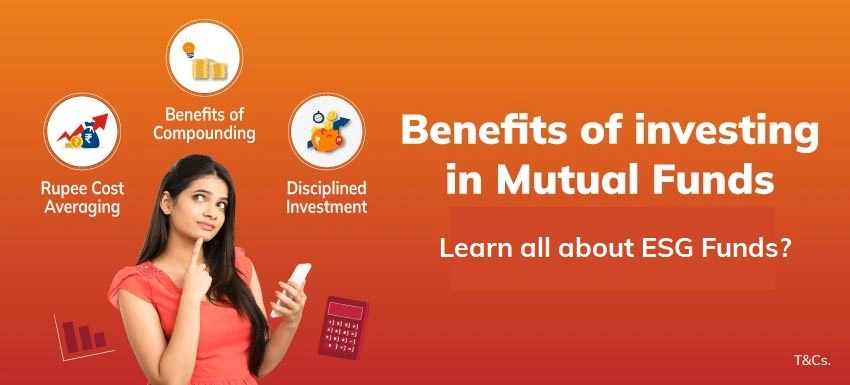THE
ORANGE
HUB
What Are ESG Funds: Meaning, How They Work, and Types

ESG stands for Environmental, Social and Governance. ESG investing is the essence of sustainable investing. Simply put, it revolves around investing in companies that have upheld E, S and G in conducting business.
The E factor focuses on a company's impact on the environment. What active steps have they taken to reduce carbon emissions, dispose of waste and conserve energy? The S factors on the other hand, highlight the well-being of the company's employees and society at large. In addition, the G factor relate to how well a company complies with the regulations, solves grievances and conducts business ethically.
So, it is about more than just the bottom line. How actively a company adopts sustainable business practices affects the share price, just as much as the quarterly revenue. Any fraud allegation could just as much topple the share price and reduce the trust of the shareholders.
What are ESG Funds?
ESG investing has been prevalent for years and is rooted in considering investments' impact on the environment, society and governance. It advocates for companies to embrace greater responsibility and morality concerning the environment and society. Under ESG funds, allocation typically includes investing in the shares and bonds of ESG-compliant companies.
How do ESG Funds Work?
1. Screening Process
The ESG funds starts with a screening process where they eliminate companies that are involved in unethical businesses like tobacco, gambling, and weapons manufacturing, keeping the rest involved in ethical practices.
2. Investment Allocation
The next step is the investment allocation where ESG funds invest across multiple industries but at the same time prioritise businesses that focus on sustainability and fair labour practices.
3. Performance Monitoring
Fund managers continuously track ESG performance and financial returns to ensure sustainable and profitable investments.
What are the Benefits of Investing in ESG Funds?
1. Ethical Investing
When you choose to invest your money in ESG mutual funds, it means that your money supports companies that are environmentally and socially responsible.
2. Strong Long-Term Growth Potential
The ESG funds are known to perform well over time. Ethical governance and sustainable business models often lead to higher investor confidence and long-term profits.
3. Low Investment Risk
ESG funds are known to avoid companies with bad governance or unethical business practices and so they can help reduce the risk of corporate scandals, and sudden stock crashes.
4. Portfolio Diversification
ESG funds invest across different industries and sectors, ensuring a well-balanced and diverse investment portfolio.
Types of ESG Mutual Funds
1. Exclusionary Funds
The first type of ESG fund is the exclusionary fund, which means they avoid investing in businesses that are dangerous to society. These can include fossil fuels, tobacco, and gambling. These funds follow an ethical investing approach by excluding such companies.
2. Best-in-Class Funds
These funds choose to invest in companies that often rank highest in ESG ratings within their sector. They generally go for companies that lead in ethical and sustainable practices.
3. Thematic ESG Funds
Thematic funds are known to invest in specific ESG themes, such as renewable energy (like solar, wind, hydro), water conservation, and gender diversity (companies with strong diversity policies)
4. Impact Funds
These funds invest in companies that aim to create a positive environmental and social impact, such as those engaged in clean energy, healthcare, and social development.
Should you invest in ESG Funds?
Currently, people worldwide recognise the importance of embracing sustainability and how it could bring about positive changes. Similarly, the world of investments has been seeing a change, because people are more aware of our activities on the environment and society. Consequently, ESG investing has emerged.
While ESG investing is still a new concept in India, it has gained momentum in the last few years. For instance, the COVID-19 pandemic played a large role in increasing people's interest in responsible investing. Of course, challenges exist with things like greenwashing, but demand for ESG funds in Asia is growing.
ESG factors have become a regulatory requirement, which have pushed companies to be more sustainable and uphold the well-being of their employees. In the past, we have even seen companies being shut down for not being ESG compliant. So, it is no longer a talking point.
Apart from the regulations, factors like foreign investment and customer perception have also pushed companies to be ESG compliant. Foreign investors are more interested in companies that have embraced the ESG norms, while customers prefer to partner with sustainable brands.
In the long run, investing in ESG Funds makes sense. ESG funds prioritise the companies committed to sustainable resource usage, employee well-being and clean governance, reducing potential risks associated with environmental, social and governance factors. Consequently, investors can avoid companies whose practices pose long-term risks to their investments.
Factoring in ESG criteria extends beyond aligning a company's ethics with investors. It helps investors avoid companies that may face serious challenges due to questionable practices, safeguarding their long-term prospects.
Differences Between ESG Funds and Traditional Funds
Feature |
ESG Funds |
Traditional Funds |
Investment Criteria |
Invest in sustainable and ethical companies |
Invest in all companies based on financial performance |
Risk Management |
Focus on long-term stability and sustainability |
Varies based on market trends |
Financial Performance |
Prioritises long-term sustainability over short-term gains |
Focuses purely on profit |
Social Impact |
Contributes to environmental and social well-being |
Impact depends on company operations |
Risks Associated with ESG Funds
While ESG funds offer numerous advantages, they are not completely risk-free. Here are some challenges investors should be aware of:
1. Limited Investment Choices
Not all companies comply with ESG standards, which means ESG funds have a limited number of investment opportunities compared to traditional funds.
2. Market Performance Risk
ESG-focused companies may take longer to generate high returns. Unlike conventional funds, which prioritise financial growth, ESG funds also consider sustainability, which may affect short-term performance.
3. Regulatory Uncertainty
Governments and regulatory bodies continue to evolve ESG-related laws and guidelines. Any sudden policy changes can impact fund performance.
4. Lack of Standardized ESG Ratings
There is no universal standard for ESG ratings, making it difficult to compare ESG funds accurately. Different funds may use different ESG evaluation criteria, leading to inconsistencies.
Taxation on ESG funds
The taxation process for ESG funds work in a similar way as equity mutual funds. For example, if you sell an ESG fund unit within 12 months then a 15% short-term capital gains tax (STCG) applies and if you hold them for more than a year, you pay a 10% long-term capital gains tax (LTCG) on gains above ₹1 lakh.
How to invest in ESG Funds?
Investing in ESG Funds is now easier with the convenience of online platforms.
Here's a step-by-step guide:
Through Internet Banking
Log in to ICICI Bank Internet Banking
Navigate to 'Investments and Insurance' and select 'Buy Mutual Funds'
Choose 'Top categories'
Select the desired scheme and proceed with your investment
Through mobile
Log in to ICICI Bank iMobile app
Go to 'Invest and Insure' and choose 'Mutual Funds'
Select 'Top categories'
Pick your preferred scheme and invest seamlessly.
Overview of ICICI Prudential ESG Fund
Investors looking for gains that surpass inflation rates and fixed-income returns should consider ICICI Prudential ESG Fund. It operates as a Thematic ESG fund, offering the fund management team the freedom to invest in companies of varying sizes to maximise gains.
This fund's adaptability makes it an optimal choice for equity fund investors. By delegating stock selection entirely to the fund manager, the fund aligns with the core principle of Mutual Fund investing. It's advisable to invest in this fund through the SIP route, ensuring a systematic and disciplined approach to investing.
Conclusion
ESG investing isn't just about allocating capital to companies that are ethically aligned with investors' values; it's a strategic move towards sustainable growth. As global awareness about environmental and social responsibilities rises, so does the importance of ESG investing.
While India is just starting its journey in ESG investing globally, socially responsible investing has gained considerable traction. The impact of ESG factors on the financial performance of companies has been significant. Studies show that companies demonstrating strong ESG performance have outperformed their counterparts in terms of stock returns, providing a robust case for ESG investments.
ESG funds reduce risks, considering factors potentially harming long-term investment prospects and steering clear of companies that don't align with sustainable practices. As the investment landscape evolves, embracing ESG factors can pave the way for a more responsible and rewarding investment journey.
Scroll to top



